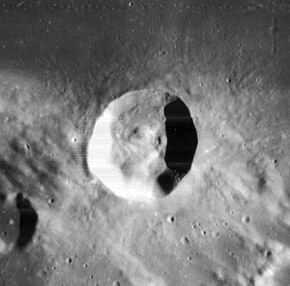Menelaus (crater)
 Lunar Orbiter 4 image | |
| Coordinates | 16°18′N 16°00′E / 16.3°N 16.0°E |
|---|---|
| Diameter | 27 km |
| Depth | 3.0 km |
| Colongitude | 344° at sunrise |
| Eponym | Menelaus of Alexandria |



Menelaus (/ˌmɛnɪˈleɪəs/) is a young lunar impact crater located on the southern shore of Mare Serenitatis near the eastern end of the Montes Hæmus mountain range. Its diameter is 27 km.[1] To the southwest is the small crater Auwers, and to the west-southwest is the even smaller Daubrée. To the northeast is a faint rille system named the Rimae Menelaus.
Description
[edit]The wall of Menelaus is slightly irregular in outline, with a high, sharp rim and terraced inner walls. The interior has a high albedo that is prominent under high sun angles. There are several ridges on the floor. It also has a moderate ray system, with the most prominent ray aligned to the north-northeast across the Mare Serenitatis. The location of this ray and slightly off-center central peak suggest an impact at a relatively low angle.
Names
[edit]Menelaus is named after the ancient Greek astronomer Menelaus of Alexandria.[1] Like many of the craters on the Moon's near side, it was given its name by Giovanni Riccioli, whose 1651 nomenclature system has become standardized.[2] Earlier lunar cartographers had given the feature different names. Michael van Langren's 1645 map calls it "Mariae Imp. Rom." after Maria Anna, the Holy Roman Empress.[3] And Johannes Hevelius called it "Byzantium (urbs)" after the city of Byzantium.[4]
Satellite craters
[edit]By convention these features are identified on lunar maps by placing the letter on the side of the crater midpoint that is closest to Menelaus.
| Menelaus | Latitude | Longitude | Diameter |
|---|---|---|---|
| A | 17.1° N | 13.4° E | 7 km |
| C | 14.8° N | 14.5° E | 4 km |
| D | 13.2° N | 16.3° E | 4 km |
| E | 13.6° N | 15.9° E | 3 km |
The following craters have been renamed by the IAU.
- Menelaus S - See Daubrée.

References
[edit]- ^ a b "Menelaus (crater)". Gazetteer of Planetary Nomenclature. USGS Astrogeology Research Program.
- ^ Ewen A. Whitaker, Mapping and Naming the Moon (Cambridge University Press, 1999), p.213.
- ^ Ewen A. Whitaker, Mapping and Naming the Moon (Cambridge University Press, 1999), p. 198.
- ^ Ewen A. Whitaker, Mapping and Naming the Moon (Cambridge University Press, 1999), p. 202.
- Andersson, L. E.; Whitaker, E. A. (1982). NASA Catalogue of Lunar Nomenclature. NASA RP-1097.
- Bussey, B.; Spudis, P. (2004). The Clementine Atlas of the Moon. New York: Cambridge University Press. ISBN 978-0-521-81528-4.
- Cocks, Elijah E.; Cocks, Josiah C. (1995). Who's Who on the Moon: A Biographical Dictionary of Lunar Nomenclature. Tudor Publishers. ISBN 978-0-936389-27-1.
- McDowell, Jonathan (July 15, 2007). "Lunar Nomenclature". Jonathan's Space Report. Retrieved 2007-10-24.
- Menzel, D. H.; Minnaert, M.; Levin, B.; Dollfus, A.; Bell, B. (1971). "Report on Lunar Nomenclature by the Working Group of Commission 17 of the IAU". Space Science Reviews. 12 (2): 136–186. Bibcode:1971SSRv...12..136M. doi:10.1007/BF00171763. S2CID 122125855.
- Moore, Patrick (2001). On the Moon. Sterling Publishing Co. ISBN 978-0-304-35469-6.
- Price, Fred W. (1988). The Moon Observer's Handbook. Cambridge University Press. ISBN 978-0-521-33500-3.
- Rükl, Antonín (1990). Atlas of the Moon. Kalmbach Books. ISBN 978-0-913135-17-4.
- Webb, Rev. T. W. (1962). Celestial Objects for Common Telescopes (6th revised ed.). Dover. ISBN 978-0-486-20917-3.
- Whitaker, Ewen A. (1999). Mapping and Naming the Moon. Cambridge University Press. ISBN 978-0-521-62248-6.
- Wlasuk, Peter T. (2000). Observing the Moon. Springer. ISBN 978-1-85233-193-1.
External links
[edit]- LTO-42D3 Menelaus — L&PI topographic map
- Small crater at the Southern Rim of Menelaus - Lunar Reconnaissance Orbiter page - featuring the photo, an interactive photo and information
- Wood, Chuck (September 7, 2004). "Helen's Husband". Lunar Photo of the Day. Archived from the original on August 5, 2012. Retrieved August 25, 2017.
- Wood, Chuck (February 19, 2008). "Yes". Lunar Photo of the Day.
- Wood, Chuck (March 12, 2008). "Craters, Rings, Spots, and Rays During Full Moon". Lunar Photo of the Day. - includes the crater Menelaus
